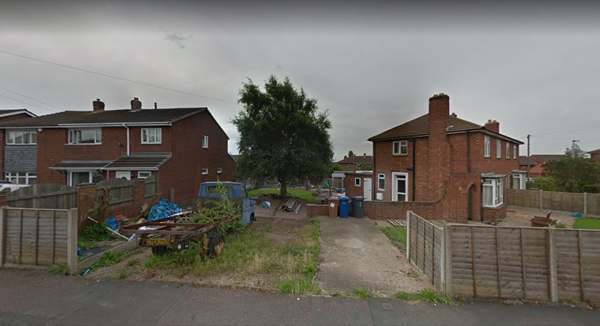Roger Boot v Bromford Housing Association [2018]
A recent appeal to the Upper Tribunal serves as a reminder of what must be established in order to obtain title by adverse possession.

(Via Google Maps)
The facts
The disputed land is shown in the image above. The blue truck belonging to Mr Boot, the appellant is repeatedly referred to in the judgment and was in evidence on the land in August 2012, courtesy of Google Maps.
The case involved a family dispute. The facts are messy, but can be summarised as follows:
- The disputed land lies between two residential houses. One of the residential houses (no. 107, shown to the right in the above photo) is owned by the respondent, Bromford Housing Association, which is also the registered proprietor of the disputed land.
- Since 1976, Mr Boot’s sister has been the tenant of no. 107. No copy of the tenancy agreement could be found, but it is not believed that the disputed land was part of the tenancy.
- Mr Boot claimed that he started to use the disputed land in 1976. He maintained that he used the land to keep vehicles on (which he repaired) and that he also grew crops on the land. Mr Boot claimed that his sister and brother-in-law, as occupiers of the adjoining house, had no independent access to the disputed land. Mr Boot’s brother-in-law admittedly sprayed cars on the disputed land from time to time, but Mr Boot claimed that this was only in his presence. Mr Boot asserted that he had claimed title to the land by adverse possession by 1989. He said that the blue truck (see photo) had been on the land for 20 years, since about 1993.
- Meanwhile, Mr Boot’s sister’s version of events was that she had accessed the land since 1980 through a gate in the hedge. She had taken down the hedge separating the disputed land from her property in 2004, extended her lawn into the disputed land and placed a swing, a slide and a dog kennel on it.
- Relations soured between Mr Boot and his sister in 2013 and accusations of stolen potatoes, violent altercations and police visits followed. Mr Boot tried to exclude his sister from the land and started to voice an interest in building a house on the plot. He applied to the Land Registry for title by adverse possession in 2014. It would appear that his sister refused to support Mr Boot’s application and Mr Boot therefore made no mention in his statutory declaration of the crucial fact that the property next door was let to his own sister.
The Law on Adverse Possession
The requirements to establish title by adverse possession are as follows:
- Uninterrupted factual possession of the land by the claimant for the requisite period – Mr Boot’s claim related to a period prior to 2003, so the requisite period in his case was 12 years.
- Intention on the part of the claimant to possess the land during that period of possession – This must be an intention to possess in the squatter's own name, on their own behalf and to the exclusion of all others. To establish factual possession there must be a sufficient degree of exclusive physical control over the land. The claimant must have been dealing with the land as an occupying owner might have been expected to deal with it and no one else must have done so.
The decision
The Upper Tribunal doubted the plausibility of some of Mr Boot’s evidence and decided that he had misremembered the extent to which he had used the land. The tribunal also found that Mr Boot’s sister and her husband had also used (and, indeed, eventually annexed part of) the disputed land. It was therefore the tribunal’s finding that Mr Boot neither had factual possession nor an intention to exclude the world.
Practical considerations
In cases such as these, everything will turn on the facts which can be evidenced. Had the tribunal preferred Mr Boot’s version of events, he may well have been successful in his claim. Both those seeking to establish adverse possession and those opposing it would be well served by gathering as much evidence as possible. Ideally, this evidence should be contemporaneous and could be by way of photographs, copy correspondence, diaries or witness statements.
If you are an owner of vacant land, inspect it regularly so that you can take early action to remove squatters and to enable you to maintain strong evidential records.
Quarter Day
Sign up for this newsletter
Autumn 2018
For general enquiries
0808 291 3524
Or we can call you back at a time of your choice
Phone lines are open 24/7, 365 days a year

